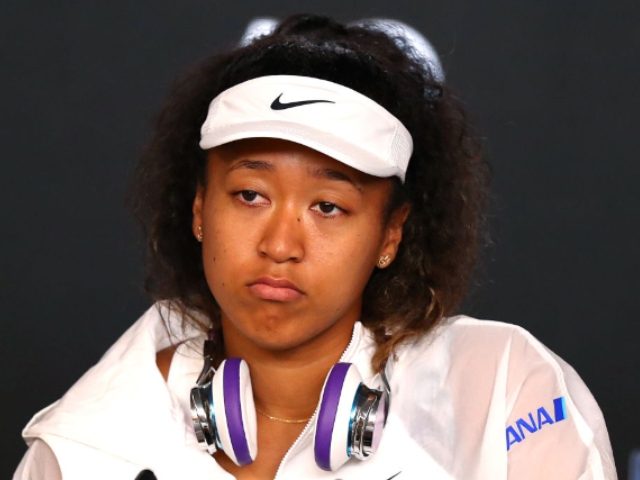In a long apologia for her decision to boycott mandated press conferences, tennis star Naomi Osaka blasted critics of anthem kneelers and said that mask-wearing in a pandemic is simply the right thing to do.
The 23-year-old star posted her explanation for her boycott with a long note to Time Magazine on Thursday in which she claimed that “the world is as divided now as I can remember in my short 23 years.”
Osaka went on to say that she feels certain “issues” are just “so obvious to me at face value.”
One thing that seemed obvious to her “at face value” is the act of protesting against the United States during the playing of the national anthem.
She noted that “kneeling to show support for anti-racism” is the right thing to do but added that she doesn’t understand why it is so “ferociously contested.”
She also insisted that it is “obvious” that people should wear a mask during a pandemic.
She wrote these things in the context of “lessons” she has learned:
Lesson one: you can never please everyone. The world is as divided now as I can remember in my short 23 years. Issues that are so obvious to me at face value, like wearing a mask in a pandemic or kneeling to show support for anti-racism, are ferociously contested. I mean, wow. So, when I said I needed to miss French Open press conferences to take care of myself mentally, I should have been prepared for what unfolded.
The rest of her explanation centered on her mental health and that of other players.
Her essential argument is that athletes should be allowed to take “sick days” as an excuse to skip press conferences for their mental health.
Osaka attempted to equate the few times a year an athlete is subjected to a press conference to the rigors of a regular person’s everyday job. Normal workers, she insisted, can take sick days whenever they want as long as they don’t abuse the privilege. So why can’t athletes skip a few press conferences in the same vein?
The tennis star explained:
Perhaps we should give athletes the right to take a mental break from media scrutiny on a rare occasion without being subject to strict sanctions.
In any other line of work, you would be forgiven for taking a personal day here and there, so long as it’s not habitual. You wouldn’t have to divulge your most personal symptoms to your employer; there would likely be HR measures protecting at least some level of privacy.
…
There can be moments for any of us where we are dealing with issues behind the scenes. Each of us as humans is going through something on some level. I have numerous suggestions to offer the tennis hierarchy, but my No. 1 suggestion would be to allow a small number of ‘sick days’ per year where you are excused from your press commitments without having to disclose your personal reasons. I believe this would bring sport in line with the rest of society.
The analogy does not quite hold up, though. In the pro non-sports workplace, people are expected to show up for their job at last five days a week, every week. By comparison, athletes are only expected to speak to the press a handful of times a year. It isn’t like a player is forced to sit before the prying press on a daily basis.
Osaka also had several people to thank for standing by her. And it is a list of the usual leftist suspect, including Michelle Obama, Michael Phelps, Steph Curry, Novak Djokovic, and Meghan Markle.
It is doubtful that Osaka’s “explanation” of why she wishes to skip press conferences — a mode of coverage she called “out of date” — will satisfy many. In the end, her main excuse is that sitting before the press in an open conference harms her “mental health,” and she simply doesn’t want to do them, Period.
Follow Warner Todd Huston on Facebook at: facebook.com/Warner.Todd.Huston.

COMMENTS
Please let us know if you're having issues with commenting.